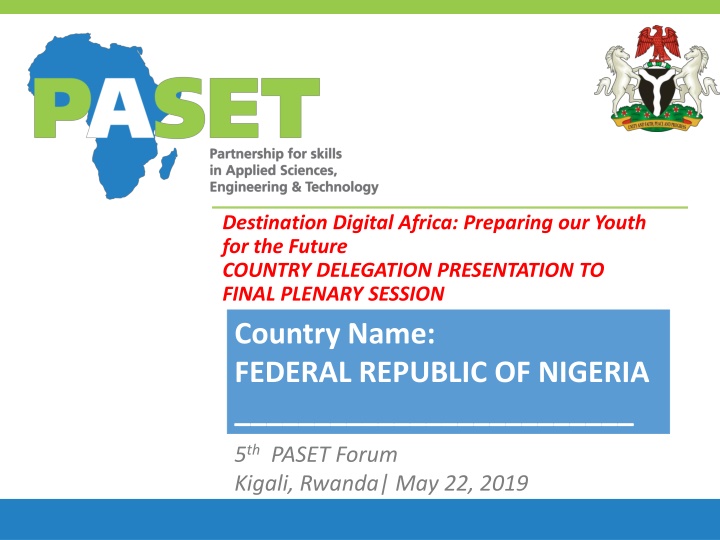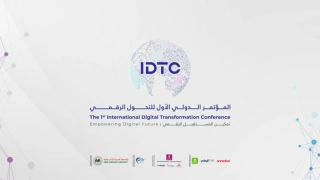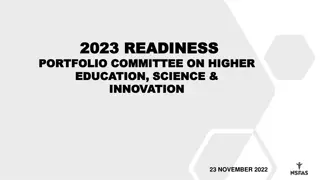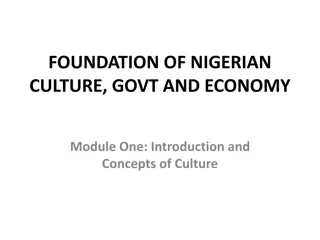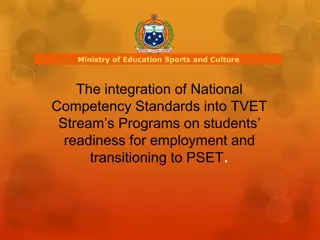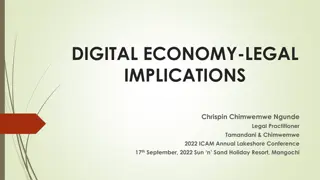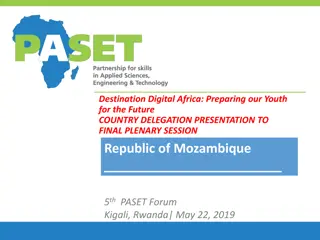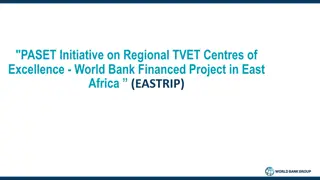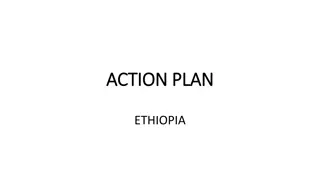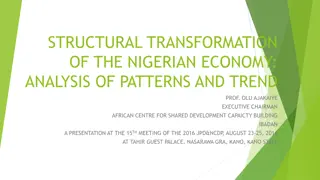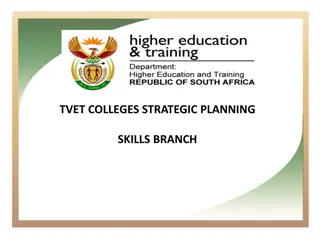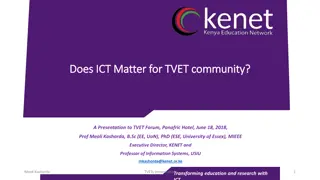Preparing Nigerian Youth for the Digital Economy: Strategies for Higher Education and TVET
Nigeria is focused on adapting higher education and TVET courses to align with the digital economy and Fourth Industrial Revolution. Initiatives include introducing new courses in software engineering and mechatronics, upgrading standards, adopting flexible learning methods, strengthening academia-industry relationships, and incorporating industry needs into curriculum. The country seeks to enhance competency-based approaches and incorporate technology in teaching to boost digital literacy.
Download Presentation

Please find below an Image/Link to download the presentation.
The content on the website is provided AS IS for your information and personal use only. It may not be sold, licensed, or shared on other websites without obtaining consent from the author.If you encounter any issues during the download, it is possible that the publisher has removed the file from their server.
You are allowed to download the files provided on this website for personal or commercial use, subject to the condition that they are used lawfully. All files are the property of their respective owners.
The content on the website is provided AS IS for your information and personal use only. It may not be sold, licensed, or shared on other websites without obtaining consent from the author.
E N D
Presentation Transcript
Destination Digital Africa: Preparing our Youth for the Future COUNTRY DELEGATION PRESENTATION TO FINAL PLENARY SESSION Country Name: FEDERAL REPUBLIC OF NIGERIA _________________________ 5thPASET Forum Kigali, Rwanda| May 22, 2019
Changes in Higher Education and TVET courses to prepare for the Fourth Industrial Revolution and Digital Economy What are the critical new courses that you would help to introduce in higher education and at the TVET level? What actions will you take to start introducing new courses and new methodologies? Develop training courses in software engineering, software development, multimedia, network & internet architecture, Cyber Security, etc. In addition for TVET develop training courses in mechatronics, web & mobile apps, Development of Benchmark Minimum Academic Standards (BMAS) which includes the curriculum and the required personnel and infrastructure for mounting these programmes Upgrade the minimum standards to include latest technologies 2
What changes need to be introduced in how university and TVET courses are taught and assessed? Introduce flexible and blended learning methods & technologies in TVET to improve quality and expand access. Strengthen Academia Industry relationship, including allowing academics to spend time in industry and bringing industry people for short term teaching and internships for students Adopting the National Skills Qualification Framework (NSQF) Assessment system in TVET courses Ensure competency-based approaches are introduced and used by TVET training institutions Deploy National Occupational Standards (NOS) developed by Sector Skills Councils (SSCs) into teaching curricula Infusion of technology in teaching and learning to assist teachers in teaching but also to make students digitally literate, 3
Changes in Higher Education and TVET courses to prepare for the Fourth Industrial Revolution and Digital Economy What steps can be taken to improve the collection of information on the specific and changing requirements of employers and integrate them into these new courses? Ensure private sector buy in to develop training curricula and assessment procedures based on industry requirements Regular conduct of labour market survey to understand the needs of the industry, which in turn inform regular curriculum review. Strengthen Sector Skill Councils Is there any approach/ experience of another country that you have learnt during this Forum that will benefit you? What kind of capacity building is required? Singapore and Korea. 4
ICT Connectivity for Higher Education and TVET Systems How would you improve your existing plan for connecting all universities, improving connectivity within university campuses , reducing costs and improving reliability of broadband connectivity? Nigeria has already established a REN the Nigerian Research and Education Network (NgREN). It has brought down connectivity cost from about $1,250/mbps/month to about $25/mbps/month. We are building on these gains to lower cost, provide efficient connectivity as well as distribution within the campuses Continuous sensitization of our higher education and TVET institutions to subscribe to the services of the REN 42 out of 170 universities are connected, no TVET institutions are connected What is your plan for strengthening the National Research and Education Network (if one exists) or to establish one; and to strengthen its links with international networks? Review of the Governance and operational modality of NgREN Encourage all HEIs and TVET institutions to subscribe and make it self sustaining 5
ICT Connectivity for Higher Education and TVET Systems What could be some steps to increase connectivity for TVET institutions? A major investment in the expansion of the NgREN, sensitization, capacity building and a clearly defined sustainability model. What have you learned during the Forum that you could adapt to your country? Ensuring all universities and TVET institutions have internet connectivity at a subsidized rate To have National Plan on the 4IR and Digital economy Funding: Involve private sectors like Dangote and Industrial Training Fund, Tetfund and Universal Basic Education, etc. Restructure curriculum to accommodate the use of ICT in the delivery. What are the technical capacity building needs? And how will you meet them? Teachers training capacity in new IT technologies may need to be built internally and externally for effective learning in our institutions. Digital content developers Specialists who can design, install and maintain networks TETFund and ITF can be encouraged to focus on these technologies and methodologies and new WB Skills Project (IDEAS) 6
Using Technology to Transform Higher Education and TVET What technologies could you immediately implement to improve access and quality in Higher Education and TVET? Immediate implementation of National ODFeL Policy for all TVET institutions Use of digital content, open and distance learning mode, and Technology Assisted Learning mode of the National Open University, etc. What technologies could you plan to deploy in the next 3-5 years ? For what purpose? Virtual education, flexible & blended learning systems, etc. How would you incentivize and help teachers / faculty to adopt technologies? Providing relevant local and international training courses , improve local content, through support of international and national experts, provision of ICT tools & facilities. How would you assess whether the technology is helping to improve student learning? Tracer Studies, Employer curriculum evaluation & satisfaction, improved employability, student assessments, etc. 7
Using Technology to Transform Higher Education and TVET What reforms could be introduced to improve procurement of technologies, ensure local content , and address the other challenges outlined in your questionnaire etc? National task force on technology in education Development of an e-platform education National policy on ICT in Education (recently approved) Establishment of National Skills Council (recently approved ) What kind of technical assistance do you need? In what specific areas? How will you get them? HR deployment for ICT supported technologies, on the job training for lecturers, technicians & technologist, etc. Feasibility studies for technology in TVET; Baseline study on digital literacy in the population; Training needs assessment for digital contents in technical professions; Through improved budgetary allocation, collaborating with IDPs, OPS, etc 8
Planning ahead What government policies or regulations need to change in order to enable higher education/ TVET institutions to be better prepared, better connected, and able to deploy technology? Be as specific as possible. Public-private-partnerships in TVET need to be strengthened at the highest levels to enhance synergy A skills development council that consist all stakeholders both public and private will coordinate training at the national level Reviewing the accreditation process in TVET institutions to reflect use of technologies, e.g. flexible & blended learning, etc. What are the most critical investments? How would you sequence them? Digital infrastructure and network development; ICT infrastructure in education institutions; Internet connectivity in educational institutions; Provision of tablet computers to all students in HE/TVET institution 9
How would you go about preparing a costed action plan, with prioritized investments to improve university and TVET courses, improving connectivity, and using technology in education? Undertake an assessment to identify key needed investments Consult with relevant stakeholders to prioritize, cost, and sequence implementation of identified investments (action plan) Ensure action plan aligned with national policies on education, ICT and employment Present plan to all stakeholders for validation 10
Planning ahead.. Contd. Which other Ministries do you need to work with ? Federal Ministries of Science & Technology, Finance, Labour & Productivity, Power, Works & Housing, Communication, among others How should we improve knowledge sharing between countries in this area? Provide an online knowledge and experience sharing platforms Link technology sources/companies to training institutions Provide exchange of expertise between institutions, employ current institutional arrangements e.g. AAU, CAPA, etc. How will you / should we monitor progress in implementation? Monitoring and biannual reporting by national, regional and continental agencies such as the NBTE, NUC, FME, ECOWAS, AUC, UNESCO will ensure objective and transparent results 11
ANNEX 12
FEDERAL REPUBLIC OF NIGERIA Federation multi party democracy Population 36 States + 1 Federal Capital Territory 774 local governments Ethnic Groups 190.89m in 2017 (WB) , over 60% < age 25 (NBS) Growth 3.2%; Life expectancy 49yrs (47m, 51f) in 2016 (NBS) Over 230 ethnic entities Over 500 languages & dialects Land area GDP USD 375.745Bn; USD1,968.4 per capita in 2017 (WB) Unemployment 0.92m square km About 22% in 2018, youths unemployment is 36% 13
FEDERAL REPUBLIC OF NIGERIA EDUCATION SECTOR Reform to achieve the 17 SDGs: Specifically Goal 4, which aims to ensure inclusive and equitable quality education and promote lifelong learning opportunities for all. Technical and Vocational Education & Training (TVET): Formal Institutions Introduction of the Nigerian Skills Qualifications Framework (NSQF) as a competency-work-based system of training and assessment Polytechnics 232 Innovation/Vocational Enterprise Institutions 236 Research and Development focus and application, technological trends, how to harness the Internet of Things (5G), Machine Learning & robotics, etc. Technical Colleges 171 NSQ Training Providers 38 14
